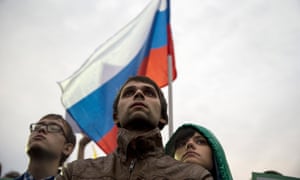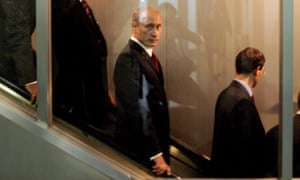What can we expect from him, since he, "... last attended the UN General Assembly in 2005"? (Moscow Times : Aug. 28 2015) (my emphasis)
No doubt he will be focusing on events in Syria, in particular trying to project himself as a 'bulwark against terrorism' whilst not even mentioning the fact that he is currently waging war in eastern Ukraine.
His denials about Russian soldiers not being in eastern Ukraine has been met with utter derision by the international community, especially in the face of a mountain of evidence showing that the Russian army is active in eastern Ukraine. Similar evidence is beginning to mount about Russian soldiers being active in Syria in support of Bashar Al Assad.
 It is therefore no wonder that
It is therefore no wonder that However, given the present state of Russia-West relations cooperation is wishful thinking." (Russia Direct : Sep 17, 2015) (my emphasis)
Tsvetkov is correct in saying that any idea of co-operation between Russia and the West is, at this moment in time, wishful thinking.
 Similarly, Eerik-Niiles Kross
(left) and Molly K. McKew state that,
Similarly, Eerik-Niiles Kross
(left) and Molly K. McKew state that,"....cooperation with Russia on Syria can have potentially disastrous consequences for the U.S., but too many Americans still don’t understand how closely linked these two headline conflicts are, and American policy has yet to confront the reality that Syria and Ukraine are part of the same mission for Russia—the destruction of the post-WWII architecture of the West." (Politico Magazine : September 22, 2015) (my emphasis)
And whilst Putin is pondering what he should say as he mounts the podium at the UN to address the General Assembly,
...Ukraine reaffirmed its NATO ambitions
Tuesday, with Prime Minister Arseniy Yatsenyuk saying he hoped the
country would become the organization’s 29th member in 2016." (World Bulletin : 23 September 2015 Wednesday) (my emphasis)
And, with the help of NATO, dirty-bomb attack training is to take place in Ukraine.
"Ukraine aims to improve its ability to respond to a radioactive attack, and NATO aims to help.
... hundreds of civilian specialists, including British experts, will join Ukrainian Special Forces this week to simulate an event involving widespread contamination of an area with radioactive material."
(UT : Sep. 23, 2015) (my emphasis)
"NATO is to modernise Ukraine's armed forces including with 'non-lethal' defensive equipment.
NATO chief Jens Stoltenberg on the last day of his trip to Ukraine said NATO would provide assistance in modernising Ukraine's armed forces, but without the supply of arms." (UT : Sep. 22, 2015) (my emphasis)
And whilst Ukraine is entering into defense and technical co-operation with NATO, and the Ukrainian army is to be modernised with the help of NATO,
The new base will house 5,000 soldiers and heavy weaponry, according to public documents and people working at the site.
It is further east than one under construction in Belgorod region reported by Reuters earlier this month but still close to the border with separatist-held parts of Ukraine's eastern Luhansk region, where there has been heavy fighting." (Reuters :
Separatist leaders in Ukraine are to propose delaying local elections by almost four months, signaling the increasing challenges of meeting a year-end deadline for implementing an agreement to resolve the conflict.
The self-declared Donetsk People’s Republic and Luhansk People’s Republic will suggest holding the elections on Feb. 21 at a meeting of the Ukraine contact group in Minsk .. " (Bloomberg Business : September 22, 2015) (my emphasis)
Notice, however, that these are only 'suggestions' and 'proposals' by Putin's rebel proxies of eastern Ukraine.
Notice, too, that this volte-face of Putin's rebel proxies has appeared rather suddenly, and coincidentally, just before Putin addresses the UN General Assembly next week.
What prevents them from going back on any 'suggestions or proposals' that they now may make, as soon as their commander-in-chief, Putin, has delivered his address to the UN General Assembly?
By so doing they will simply be imitating Putin himself, who is a master at going back on his 'word'.
The diplomatic world is aware of this character trait of Putin.
He is not to be trusted. He is a liar. After saying that 'little green men' had taken over Crimea, he later admitted publicly that they were, in fact, Russian soldiers.
So what will be the response of the UN General Assembly when he addresses them next week?
"Ukrainian military pilot Nadia Savchenko (left) has made a show of defiance, denying charges against her at
the opening of her controversial trial in Russia.
(to be continued)



















